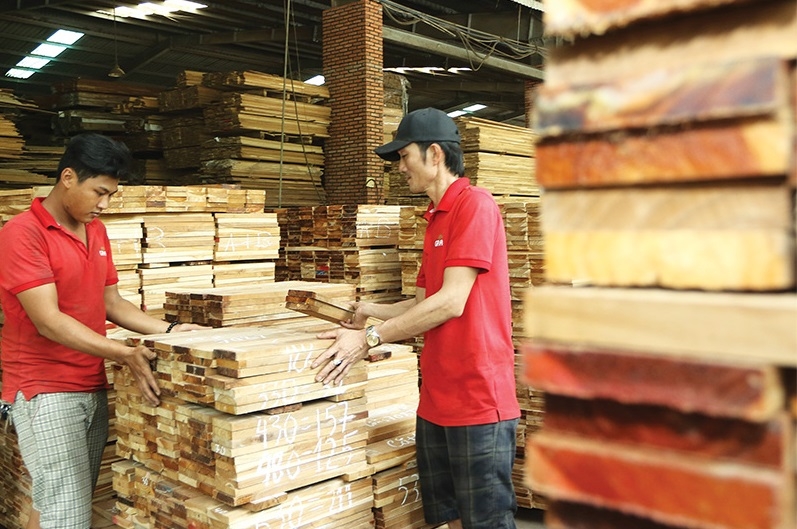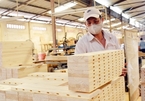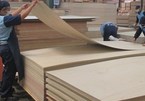 |
| Until the beginning of June, Vietnam’s exports of kitchen furniture and parts rose by 58 and 17 per cent, respectively |
Junma Phu Tho Co., Ltd., a fully Chinese-owned business in Vietnam, is under investigation for tax avoidance, dumping, and countervailing duties by the US Department of Commerce (DoC).
The investigation started in earlier in April as the US Coalition for Fair Trade of Hardwood Plywood asked the DOC to investigate whether the company would evade anti-dumping and anti-subsidy duties applied to Chinese products, which caused some Chinese manufacturers to ship parts of their products to Vietnam for assembly before exporting them to the US.
In a statement to VIR, Junma’s representative Cu Duc Hoang Tai said that his company “is currently completing all necessary documents to prove that we source our input materials from Vietnam,” adding that “if the company manages to explain everything well, the investigation would not affect Junma much.”
Nevertheless, the company considers hiring a lawyer to support its defence as explaining the origin of plywood from Vietnam is challenging. Failure to provide a simple explanation has already cost Junma an additional anti-dumping tax of 10.55 per cent until the end of September in another case with the South Korean Ministry of Economy and Finance.
Junma currently holds about 30 per cent market share for Vietnamese plywood exports into the US. In addition to the current investigation, Tai also worries about further import restrictions by the US if the pandemic continues to develop more severely. Its impact has already narrowed Junma’s exports from the previous 450 containers per month to a mere 200.
US President Donald Trump’s trade policies aim to reduce the nation’s trade deficit and protect domestic producers, which directly impacts the Chinese wood industry to a level that creates a large surplus of goods. In addition, Trump’s policies spurred a wave of investment into Vietnam’s wood industry, leading to new fundings, the increase of capital to expand the country’s production, and capital contributions through share purchases.
In 2018, US Customs and Border Protection initiated an investigation of Fine Wood Vietnam, another Chinese-owned company operating in Vietnam that imports plywood from China. The company allegedly changed the origin and address labels to Vietnam before exporting its goods to the US.
Tran Le Huy, vice chairman of the Forest Product Association of Binh Dinh said, “It is not easy to know which Vietnamese plywood materials are in fact sourced here, while some signs point towards commercial wrongdoing. One just needs to connect the sudden increase of Chinese investment into this sector with the rapid expansion of plywood supplies from this country to come up with such an idea.”
According to Huy, the volume of Chinese plywood imports into Vietnam has increased sharply since 2018 and reached up to 500,000 cubic metres per year, equivalent to nearly $200 million and roughly 90 per cent of Vietnam’s total plywood imports.
Meanwhile, Chinese capital flows into Vietnam’s wood sector surged, reaching 29 projects from 2015 to late June, which accounted for 69 per cent of total Chinese projects into Vietnam. However, most of these projects are small in size and only reach an investment of about $1-3 million per project.
Recently, the US government has been paying more attention towards plywood products imported into the country, since the DoC’s officially imposed anti-dumping taxes on Chinese kitchen cabinets. Meanwhile, Vietnamese exports of products classified as kitchen furniture or parts thereof surged dramatically.
Data from a report of non-profit organisation Forest Trends and several local timber associations showed that in 2019, the exports of these two items increased by 34 per cent on-year. The US imported nearly $220 million worth of kitchen furniture and parts, accounting for 59 per cent of all Vietnamese exports in these two segments. In the same year, the US imported a total of $635 million of wood products from Vietnam, covering 81 per cent of the country’s total export turnover.
In the first five months of this year, Vietnamese exports of kitchen furniture and parts to the US increased by 124 and 22 per cent respectively, while these two export segments overall rose 58 and 17 per cent respectively. Exports of products such as bedroom and office furniture saw a huge drop due to the impact of the pandemic.
While Vietnam’s export turnover of kitchen furniture and parts climbed to the US, imports of these products into Vietnam also increased. According to analysts, this may be a response of exporting manufacturers to the increasing US demand and China’s oversupply due to these countries’ trade tensions. Another possibility is that Chinese enterprises aim towards evading tax duties by using Vietnam as a channel for exports to the US.
Moreover, policy gaps may have a negative impact on local businesses’ competitiveness in both the domestic and US markets. Nguyen Liem, general director of wood exporter Lam Viet JSC, argued that Chinese enterprises are using these gaps to their advantage and raising their presence in Vietnam to not only produce here but also label their products as if they were entirely from this country.
Meanwhile, the issuance of certificates of origin for wood products of foreign-invested enterprises seems to lack oversight. For instance, as a rule, enterprises can acquire these certificates for products with at least 30 per cent added value. However, how the level of added value is classified remains difficult to control.
On the bright side, imports of wood products into Vietnam are strictly classified by local customs. The overall import value of such products also increased sharply in 2019, reaching nearly $125 million, up 136 per cent compared to 2018.
Meanwhile, import values for furniture parts from 2018 to 2019 even increased by 312 per cent, and in the first five months of 2020 showed an up of 187 per cent compared to the same period in 2019.
As there are currently risks for Vietnamese plywood exports to the US and other markets like South Korea and Turkey, analysts recommend that regulators should find and implement mechanisms to reduce risks for companies involved either directly in the plywood supply chain or in products chains that use plywood as an input material. VIR
Van Nguyen

Chinese found counterfeiting Vietnamese origin for woodwork exports
Many Chinese wooden furniture manufacturers have been found setting up foreign invested enterprises (FIEs) in Vietnam to ‘fabricate’ Vietnamese origin for their exports to the US.

Plywood exports face trade defence risks in US, RoK
Vietnam’s plywood exports, despite good growth amid the COVID-19 pandemic, are facing allegations of dumping and evading trade remedies in two largest markets namely the Republic of Korea (RoK) and the US.